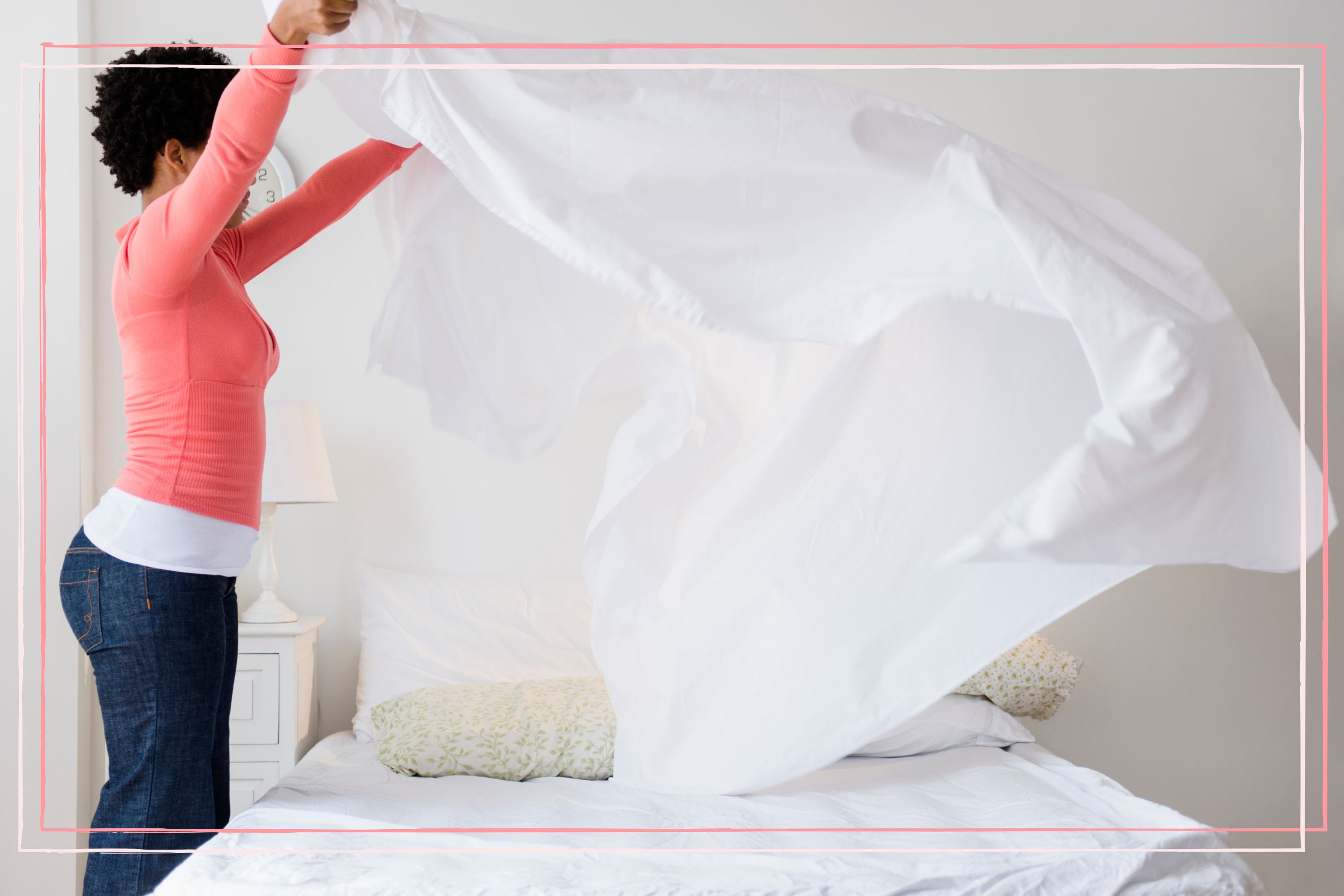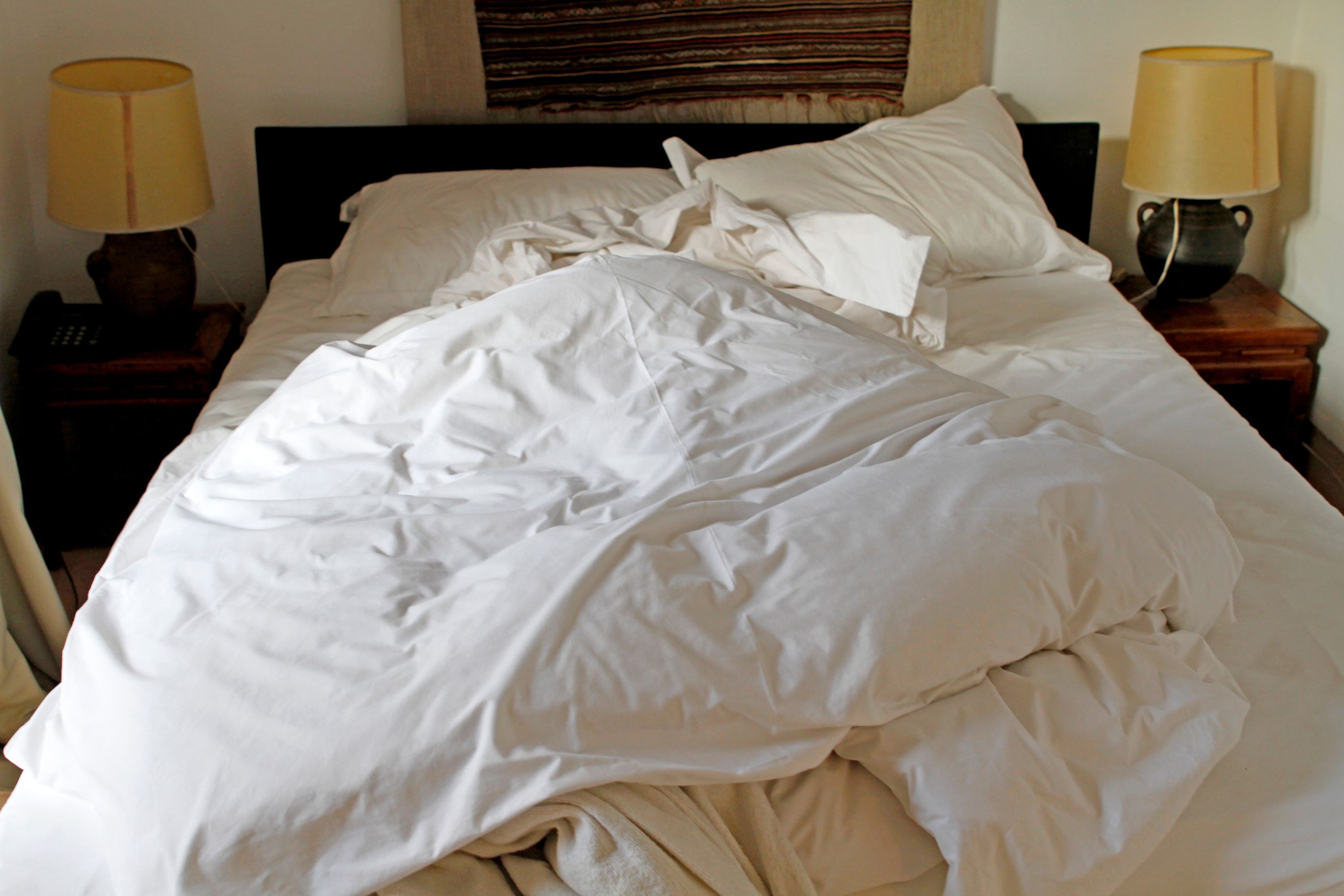How often should you change your sheets? Here's what the experts say
We've asked the experts for their tips on keeping your sheets fresh


It's difficult to know the answer to how often should you change your sheets, which is why we've asked the experts for their advice.
Let's be honest, washing your sheets isn't an enjoyable task, especially in the winter months. It's hard enough knowing how to dry clothes without a dryer when the weather's bad, and adding a huge fitted sheet into the mix doesn't help matters. But given we spend many hours each week sleeping on top of them, it's important to keep our sheets clean.
So, if you're a fan of Mrs Hinch cleaning tips and have been wondering how often you should clean this everyday item, we've done all the research for you. As Georgia Metcalfe, founder of online bedroom retailer French Bedroom, says: "The fitted sheet is the most used and dirty part of a bed and can absorb things from our skin like oils and sweat, so it's important to wash yours regularly."
How often should you change your sheets?
The general consensus is that you should change your sheets once a week. Sleeping in the same sheets every night means they can rack up a serious collection of sweat, body oils, saliva, dirt from outside and more, so it's important you wash them frequently.
Alison Hughes, Interiors Director at Coast Road Furniture, told us: "The frequency you should change your sheets depends partly on the time of year. As a general rule of thumb it’s best to change your sheets once a week for good bedroom hygiene, although if you are away two or three nights a week then washing them fortnightly should suffice. During particularly hot spells you may want to up this to a couple of times a week. Of course if you spill something or spot a stain on your sheets, you should wash them as soon as possible and use some form of stain-remover according to the sheet’s washing instructions."

Georgia Metcalfe agrees, and advises changing your sheets every four to seven days. She adds: "If you suffer from allergies or allow pets to sleep on a bed it is more vital to do so, as they are likely to bring bugs and dirt from outside onto the linen. For those who tend to get very hot make sure to wash it around every four days."
You should also change your sheets more regularly if you or someone else you live with is feeling ill, as it could be contagious.
Parenting advice, hot topics, best buys and family finance tips delivered straight to your inbox.
Reasons to change your sheets
- It's been a week or more since you last changed your sheets
- You or someone else in the house has allergies
- You let your pets sleep in the beds
- You or someone in the house suffers with night sweats
- You or someone you live with is feeling ill
- Your sheets looked stained or smell bad
- You often eat in bed
- You sleep naked
What happens if you don't change your sheets?
If you don't change your sheets regularly, you are exposing yourself to dirt and bacteria that can cause or trigger skin conditions. It's even possible to pick up an infection if you have a small cut on your body and are sleeping in dirty sheets.
Joanna Ross, general manager of design at bedding brand Sheridan, explains, "Not washing your sheets regularly exposes you to fungi, bacteria, pollen, and animal dander that is commonly found on your bed sheets. Other things like bodily secretions, sweat and skin cells can linger on bedding and whilst these may not make you sick, they can trigger eczema or cause dermatitis so it’s better to be on the safe side and wash your bed linen more frequently."
Other effects of not changing your bed sheets frequently enough include allergy symptoms, poor sleep quality and your sheets starting to smell.
'Your bed needs to be clean!'Stacey Solomon has caused a stir by revealing she recommends washing your bed sheets once a week. So how often should you change your sheets?It's a heated debate! pic.twitter.com/NTu5Aa4DjfJanuary 25, 2023
How to wash bed sheets
- Read the product label first, to check for any specific care instructions.
- Wash bedding at 60 degrees, as this is the recommended temperature for killing germs
- Use a gentle detergent - if you have sensitive skin you might want to rinse the sheets twice
- Air dry your sheets when possible, as this is less costly and will avoid wrinkling them
Alison told us: "Before putting your sheets in the wash make sure to check for stains, as these can be more difficult to get out after the wash. You should be able to use a regular stain remover, but always check the washing and care instructions on the sheets before doing so. Use the amount of detergent recommended on the packaging for the most effective wash.
It’s best to wash your bed sheets at the warmest recommended setting. This is especially important if they’re soiled or you’ve been ill, as a warm wash kills the bacteria. Many people wash their bed sheets along with towels but this can make the sheets wear faster as particularly rough towels can act like sandpaper, so it’s best to avoid this.
When it comes to drying the sheets, using a tumble dryer is usually fine as long as it’s on a low setting, but check the care instructions prior. Drying the sheets outside can give them that lovely fresh scent, but make sure to turn them inside out on sunny days so the sunlight doesn’t fade the colour."
Georgia Metcalfe adds: "If your sheets are made of silk, use a non-biological detergent specifically for silk as biological detergents can damage the grains. This should also be done on a much lower heat, at 30°C."
How to keep sheets clean between washes
- Shower before bed
- Remove make up before you go to sleep
- Avoid eating or drinking in bed
- Don't allow pets on your bed
- Make sure recently washed sheets are completely dry before storing away
- Keep your clean sheets in a dry space with good airflow
Another great tip is to let your mattress air in the morning before making your bed. Dust mites thrive in warmer environments, so letting your mattress air allows it to cool down and decreases the number of dust mites it attracts.
How often should you wash other bedding?
1. Pillows
Pillowcases should be washed once a week along with sheets, although you may want to consider washing them more often if you have oily hair, sometimes sleep in make up or apply a heavy moisturiser before bed.
The pillows themselves should be washed roughly every three months. Lucy Ackroyd, head of design at towel and bedding manufacturer Christy told us: "Similar to bedding, pillows contain a build-up of sweat and dead skin. Most good quality ones will be able to endure several washes without going lumpy, but be sure to check the care label, as synthetic and feather pillows can be washed at slightly different temperatures."
To wash your pillows, Lucy advises, "In the washing machine, along with regular detergent, add around 200ml of distilled vinegar, as this will help to disinfect your pillows. You can add your favourite essential oils to prevent your pillows from holding on to the smell of the vinegar."
She adds: "If you have memory foam pillows, avoid using a washing machine and instead wash them by hand. Submerge the pillow in warm water, add a capful of detergent and wash the pillow by evenly distributing the detergent while massaging all the dirt out."
2. Duvets
Duvet covers should also be washed every week. Georgia Metcalfe says: "As duvet covers sit on top of the bed, dust and dirt will accumulate from day-to-day use. In colder spells, we clutch onto our covers to stay warm so if bacteria, dirt and grime are left on for long then it can cause them to smell, irritate skin and in some cases make you prone to illness."
Duvet inserts however should be cleaned every three months as they are protected by the cover. But while duvet covers do provide protection, thousands of dust mites can live on an insert after a few months.
You can machine was duvets, but getting a professional clean is far safer if it is made from down feathers. If cleaned at home, ensure to line dry it and use an anti-bacterial detergent.
Duvets can last as long as 15 to 20 years when used with a cover and washed or dry cleaned regularly, after this you should consider replacing them.
3. Blankets
Once every two weeks is a good guideline for washing your blankets. You don't need to wash them as frequently as your bedding if they spend less time in contact with your skin, but if you use them often it's still a good idea to give them a regular clean, as they will also build up bacteria and dust.
If you don't sleep with your blanket, and use it more for throwing over yourself when you're on the sofa watching TV, then you don't need to wash it so often - once a month should be fine.
But just like you should wash the bedding you use more frequently when you're sick, the same rule goes for your blankets.

4. Mattresses
Alison Hughes says: "It's equally important to keep your mattress clean as well as your sheets. While mattress cleaning is an often-neglected task, doing so can expand the lifespan of the product. If you don’t clean it two times a year as recommended, the oils and dead skin your body produces can accumulate in the mattress, causing it to deteriorate faster than a clean one.
She explains, "This task is an important one when it comes to bedroom hygiene, but is especially crucial for those with dust allergies as the dusty debris can prevent you from getting good quality sleep."
It's recommended that you replace your mattress every eight years. This will ensure you continue to get a good night's sleep and prevent you from waking up feeling sore and stiff.
Video of the Week

Ellie is GoodtoKnow’s Family News Editor and covers all the latest trends in the parenting world - from relationship advice and baby names to wellbeing and self-care ideas for busy mums. Ellie is also an NCTJ-qualified journalist and has a distinction in MA Magazine Journalism from Nottingham Trent University and a first-class degree in Journalism from Cardiff University. Previously, Ellie has worked with BBC Good Food, The Big Issue, and the Nottingham Post, as well as freelancing as an arts and entertainment writer alongside her studies. When she’s not got her nose in a book, you’ll probably find Ellie jogging around her local park, indulging in an insta-worthy restaurant, or watching Netflix’s newest true crime documentary.